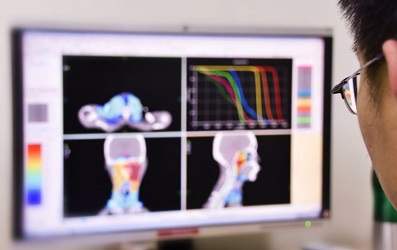AI In Medicine: U.S. Scientists Develop AI Tool To Quickly Diagnose Sarcopenia In Individuals With Head And Neck Squamous Cell Carcinoma
Thailand Medical News Team Aug 18, 2023 2 years, 6 months, 1 week, 3 hours, 6 minutes ago
AI In Medicine: Artificial Intelligence (AI) is rapidly transforming the field of medicine, offering innovative solutions to complex challenges. One recent breakthrough comes from researchers at the Dana-Farber Cancer Institute, who have harnessed the power of AI to revolutionize the diagnosis and treatment of sarcopenia in patients with head and neck squamous cell carcinoma (HNSCC). Sarcopenia, a condition characterized by muscle wasting, can have dire consequences for patients undergoing treatment for HNSCC, and this new AI tool promises to provide rapid and accurate assessments, improving patient outcomes and quality of life.
 The Significance of Sarcopenia in HNSCC
The Significance of Sarcopenia in HNSCC
Head and neck cancers are often treated with a combination of surgery, radiation, and chemotherapy, which can be both curative and taxing on the body. Unfortunately, these treatments can lead to side effects that hinder a patient's ability to eat and drink, resulting in malnutrition and muscle wasting, a condition known as sarcopenia. Sarcopenia has been linked to a higher likelihood of needing a feeding tube, reduced quality of life, and increased mortality. Identifying and addressing sarcopenia early in the treatment process is crucial for improving patient well-being and treatment outcomes.
Lead author, Dr Benjamin Kann, MD, radiation oncologist in the Department of Radiation Oncology at Dana-Farber Brigham Cancer Center told
AI In Medicine reporters from TMN, “Sarcopenia is an indicator that the patient is not doing well. A real-time tool that tells us when a patient is losing muscle mass would trigger us to intervene and do something supportive to help." He added, “Sarcopenia is associated with an increased chance of needing a feeding tube, having a lower quality of life, and worse outcomes in general, including earlier death. Muscle mass is a very important indicator of health. People with more muscle mass are generally healthier and more robust."
Traditional Diagnostic Challenges
Currently, sarcopenia diagnosis involves analyzing computed tomography (CT) scans of the abdomen or neck to assess muscle mass. However, this process is labor-intensive and time-consuming, requiring skilled experts to manually differentiate muscle tissue from other structures. Due to its complexity, this assessment is not regularly performed, which limits its clinical utility. Recognizing the need for a more efficient and accurate solution, researchers turned to AI to tackle this diagnostic hurdle.
AI-Powered Sarcopenia Diagnosis
In a groundbreaking study published in JAMA Network Open, the team from Dana-Farber Cancer Institute developed an AI model capable of accurately diagnosing sarcopenia using CT scans of the neck. To train the AI, they assembled a dataset of CT scans and clinical records from 420 patients with HNSCC. A skeletal muscle index (SMI) score, a measure of muscle mass, was calculated for each patient based on expert assessments of the scans. The AI model was then trained to replicate these assessments.
The AI model employs deep learning, a subset of AI, to automatically identify and delineate neck muscles from ot
her tissues in the CT scans. This process, which takes just 0.15 seconds, provides an efficient and consistent assessment of muscle mass. Importantly, the AI-generated muscle outlines can be easily verified by medical professionals, enhancing transparency and confidence in the tool's results.
Validating the AI's Effectiveness
To ensure the reliability and clinical relevance of their AI tool, the researchers employed a separate dataset from a different patient group for validation. The AI model's performance was compared against expert panel assessments, and it achieved clinically acceptable results in 96.2% of cases. This validation solidified the AI's potential as a robust diagnostic tool for sarcopenia in HNSCC patients.
Advantages Over Traditional Metrics
The AI-driven SMI assessment displayed clear advantages over the traditional body-mass index (BMI) as an indicator of patient health decline. Unlike BMI, SMI accounts for muscle mass, providing a more comprehensive measure of a patient's physical well-being. As a result, SMI offers better predictive value for poor outcomes, making it a potentially more valuable clinical tool for guiding treatment decisions and interventions.
The Path Forward
This AI tool not only promises to revolutionize sarcopenia diagnosis but also has the potential to guide treatment strategies. By providing real-time, accurate assessments of muscle mass throughout a patient's treatment journey, doctors can proactively intervene to prevent or mitigate muscle wasting. Additionally, the AI tool could aid in tailoring treatment plans based on a patient's physical condition, optimizing therapeutic approaches for better outcomes.
Looking ahead, the researchers plan to expand the tool's application to patients participating in clinical trials. This broader implementation will yield valuable insights into how muscle mass changes during treatment and how this information can inform and enhance treatment decisions.
Conclusion
The collaboration between AI and medicine has yielded an innovative solution to a longstanding diagnostic challenge in the treatment of head and neck cancer. The AI-driven sarcopenia assessment tool developed by the Dana-Farber Cancer Institute demonstrates the potential of AI to not only improve diagnosis but also enhance treatment strategies and patient care. With its rapid and accurate muscle mass assessments, this AI tool holds the promise of transforming the landscape of head and neck cancer treatment, offering hope and better quality of life to countless patients around the world.
The study findings ca be found here:
https://jamanetwork.com/journals/jamanetworkopen/fullarticle/2808141
For the latest on
AI In Medicine, keep on logging to Thailand Medical News.
